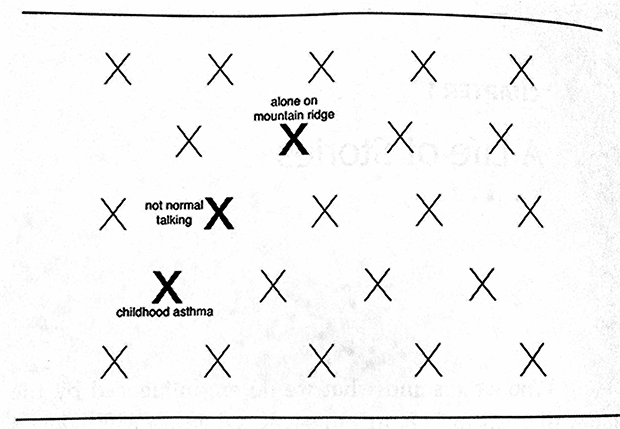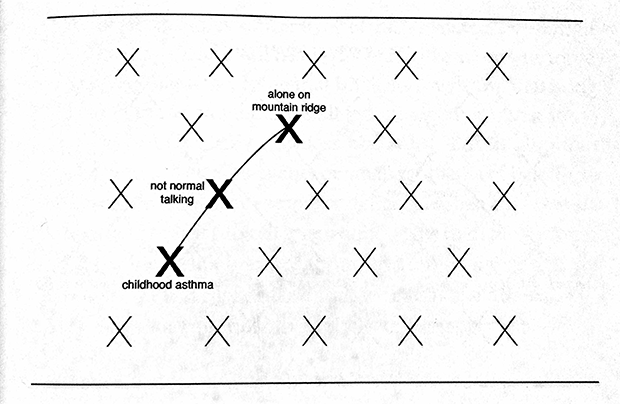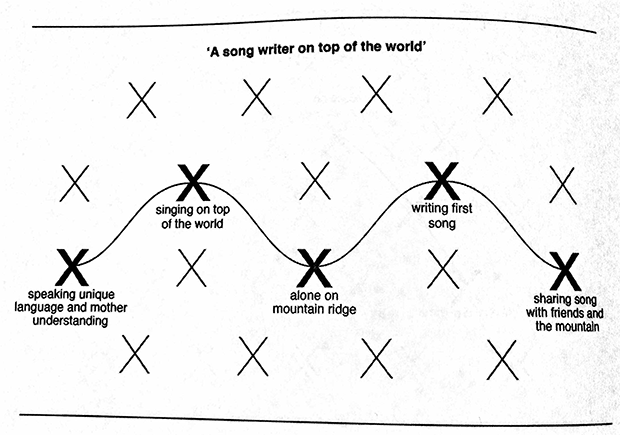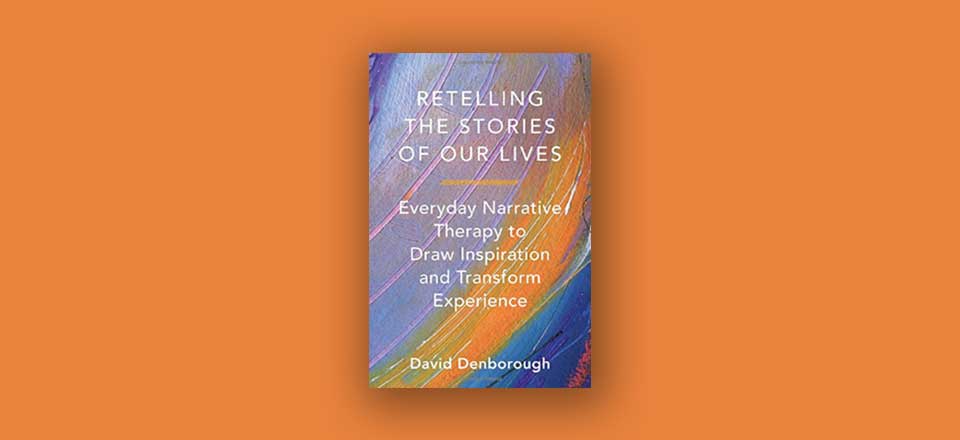Our lives and their pathways are not fixed in stone; instead they are shaped by story. The ways in which we understand and share the stories of our lives therefore make all the difference. If we tell stories that emphasize only desolation, then we become weaker. Alternatively, we can tell our stories in ways that make us stronger, in ways that soothe the losses, in ways that ease sorrow.
–David Denborough
This revelation, so elegantly stated above, is something I came to know independently. I had been studying the works of Carl Jung and Joseph Campbell in an attempt to become a better storyteller.
I wanted to be the kind of artist who understood how stories worked, why they played such large roles in our lives and culture, why people respond to them so strongly, and perhaps most importantly at the time–how to tell the kinds of powerful stories that change the world.
Imagine my surprise then, when instead of changing the world, this new knowledge of storytelling instead changed me. Which, I’ve come to believe, is and always has been the entire point of storytelling.
Stories shape us just as much as we shape the stories we create. Which makes understanding how stories work on a structural and psychological level so important.
They matter not only in the context of entertainment, news, or business–but perhaps most importantly in our private thought-lives and personal relationships.
Thankfully, books like Retelling the Stories of Our Lives make stating and demonstrating these concepts much easier.
In a few hundred pages of incredibly readable and straightforward text, author and narrative therapist David Denborough unpacks some stunning insights into how stories shape both our internal and external lives.
He then provides–through stories (what else?) and storytelling exercises–simple yet powerful methods for taking control or our identities and lives one narrative at a time.
Recognizing that Our Lives and Identities are Stories We Tell Ourselves
Knowing, in an abstract way, that the stories we hear and tell have the power to shape our inner lives is one thing. Understanding how that works is quite another.
I found that one of the most powerful things this book did was to offer a crystal clear explanation of this (in a visual format) right in first chapter.
In the three images below, author David Denborough shows how the events in our lives are often connected (usually unconsciously) in ways that are less than healthy. Or true for that matter.

In the image above, each “X” represents a life event. Only three of those events, out of many possibilities, are highlighted.
This reflects the way in which we are forced to tell the stories of our lives and identities by highlighting events and experiences that have shaped us.
We then connect those events, as in the image below, to form a narrative of identity.

This particular narrative might be understood as “the lonely boy narrative”. As you can imagine, this kind of narrative may result in feelings of isolation or worthlessness.
That was certainly the case for Denborough, who saw fit to reshape this narrative from his own life into something more empowering and healthy. All without misrepresenting the truth, merely by choosing to highlight different life events, experiences, and responses.

The resulting narrative of identity is something he calls “A song writer on top of the world”. A narrative that took him from seeing himself as a loner with difficulty connecting to others to a songwriter who has always had a unique way with language–one he now feels empowered to share through song.
In very simple terms, this is what it means to retell the stories of our lives. But it doesn’t always feel this easy when looking at the deeply personal, impactful, sometimes traumatic experiences of our own pasts which we feel have (and perhaps always will) shape who we are.
Claiming Our Rights as the Authors of Our Lives and Identities
It’s not always easy to look back on our lives and feel like we have any right to “re-connect the dots” and shape a healthier story of who we are. Especially when our past includes trauma or abuse–which can often result in a sense of helplessness and impotence.
When our lives have been more tragedy than triumph, too often this is because other people have written the stories that influence our lives, or because broader powers such as sexism, violence, racism, or poverty have become the authors of the storylines of our identity.
It is in these instances however when it is most important to claim what Denborough calls our storytelling rights.
The Charter of Storytelling Rights
Article 1. Everyone has the right to define their experiences and problems in their own words and terms.
Article 2. Everyone has the right to have their life understood in the context of what they have been through and in the context of their relationships with others.
Article 3. Everyone has the right to invite others who are important to them to be involved in the process of reclaiming their life from the effects of hardship.
Article 4. Everyone has the right not to have problems caused by trauma and injustice located inside them, internally, as if there were some deficit in them. The person is not the problem; the problem is the problem.
Article 5. Everyone has the right to have their responses to hard times acknowledged. No one is a passive recipient of hardship. People always respond. People always protest injustice.
Article 6. Everyone has the right to have their skills and knowledge of survival respected, honored, and acknowledged.
Article 7. Everyone has the right to know and experience that what they have learned through hard times can make a contribution to the lives of others in similar situations.
By claiming these rights we give ourselves permission to be the ultimate authority on our own life and experiences. As soon as this occurs, we can begin to tell and retell the stories that define who we are and how we relate to the world around us.
Putting Our Storytelling Rights Into Action
Denborough goes on in the following chapters to build upon these basic ideas and provide a series of simple ways in which stories can be used to reclaim our identities, reforge relationships, and transform any past into a future full of hope and new possibilities.
He explores:
- How to externalize problems in order to work through them
- Finding the right audiences for our stories
- Questioning normality and escaping failure
- Reclaiming our lives from trauma
- Dealing with the loss of loved ones
- Facing the end of our lives through story
- Finding a larger context for our stories
- And more
One exercise in particular, which I will be sharing in my next post, teaches a visual metaphor centered on the image of a tree. By labeling the various parts of the image with places, people, events, values, and more we are then able to begin working our way through the storylines of our identity and the impact of people, events, and experiences in our past.
I found this experience to be transformative in my own life. I found it to be so incredibly helpful and flexible as a concept, that I’ve included it as an integral part of my personal journaling, fictional storytelling, and even client based work.
In addition to picking up a copy of this book for yourself, which includes several other fantastic exercises, I hope you’ll be back for my next post as I go into more detail concerning this particular exercise.
In Closing
I cannot recommend this book highly enough. I found it to not only contain invaluable information and insights, but it’s written in such a way that literally anyone from a middle school reading level and up could understand the concepts/exercises and use them on their own or with friends/family. I expect to be using and referencing this book (and others like it) for years to come.
How has the introduction to these ideas affected you? Are you interested in revising the story of your identity and life? I’d love to read your thoughts in the comments section below.
All images in post via Retelling the Stories of Our Lives.

Hello, I found you by accident. I was looking for a support group for Loss of a loved one due to violence/murder.
Re-telling our story is the name of one of the groups. I found your post to be very informative and helpful because 1- my twin sister is a healer and believes and teaches that we have a right to our truth, our story of our lives and 2- I am writing a book regarding my story & my experiences with mental illness & childhood abuse. Ive been stuck & unable to write for over 6 months now. After reading your post i am feeling inspired to write again, join that support group in San Diego & move forward toward healing from my best friends murder. She was killed just last week. Thank you for your post.
Thank you,
Laurie
I am so sorry to hear about your friend. You must really be hurting. I’m glad that you’ve found some inspiration here and I hope you’re able to heal, write your book, and share your story with the world.